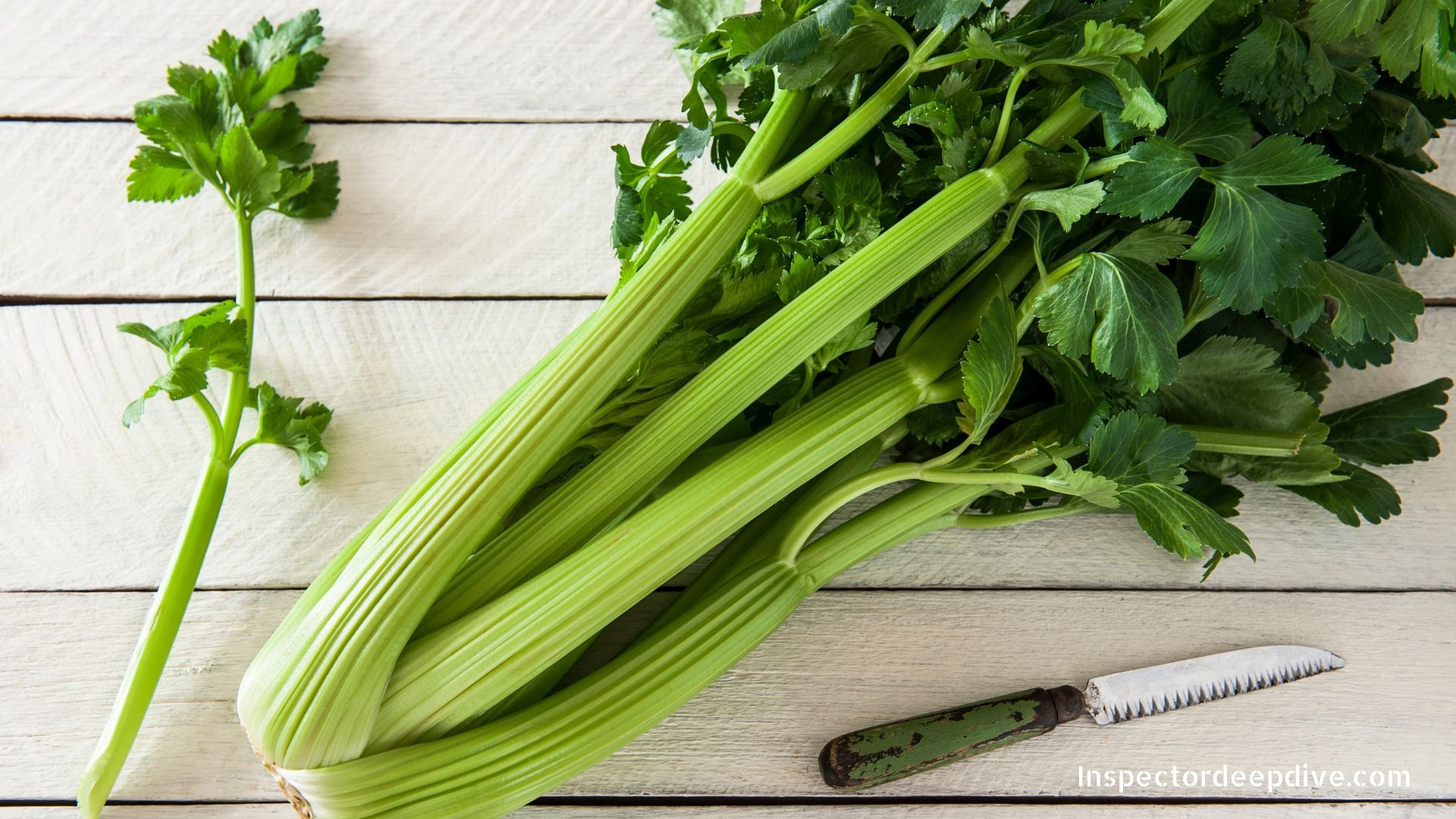
Power of Celery: Hydration, Detox, and Digestive Health

Scientific Name: Apium graveolens var. dulce
What Is Celery
Celery is a crisp, water-rich vegetable commonly eaten raw or used in soups, stews, and salads. Known for its low-calorie content and high water composition, it also contains valuable antioxidants, minerals, and compounds that support digestion and hydration. Its long stalks, leaves, and seeds all offer nutritional benefits.
Where Does It Come From
Celery originated in the Mediterranean region and was historically used for medicinal purposes. It was later cultivated in Europe and spread to the Americas. Today, major producers include the United States, China, and India. It grows best in cool, moist conditions and has been selectively bred for tender stalks and mild flavor.
How Many Varieties
There are several celery types including Pascal (green, upright stalks), Golden Self-Blanching (light green, tender), Red or Purple Celery (rich in anthocyanins), Leaf Celery (used for herbs and seeds), and Celeriac (root celery, used for its bulbous base). Each varies slightly in texture, color, and use.
Seasonality & Availability
Celery is available year-round in most markets due to controlled farming, but peak season runs from late fall through early spring. Fresh stalks should be firm and pale green with no wilting or browning.
Benefits of Celery
Celery supports hydration, aids digestion, reduces inflammation, and helps regulate blood pressure. It contains antioxidants that protect cells from oxidative stress and compounds that support liver detoxification. Regular consumption may help reduce bloating and promote gut health.
The Anti Factor
Anti-inflammatory: Contains luteolin and other flavonoids that reduce chronic inflammation
Antioxidant: Rich in vitamin C, beta-carotene, and phenolic compounds that combat free radicals
Detoxifying: Liver-supporting compounds like apigenin assist natural cleansing processes
Gut-supporting: Natural fibre and prebiotic content promote digestive wellness
Heart-protective: Potassium and magnesium help maintain healthy blood pressure and circulation
Nutritional BREAKDOWN
Vitamins (per 50g cooked)
Vitamin K: 14 µg: Promotes blood clotting and bone strength
Vitamin C: 1.7 mg: Boosts immunity and skin health
Folate: 3 µg: Essential for DNA synthesis and cellular function
Vitamin A: 102 IU: Supports vision and immune integrity
Riboflavin: 0.03 mg: Assists energy metabolism
Minerals (per 50g cooked)
Potassium: 120 mg: Regulates heart rate and muscle function
Calcium: 20 mg: Contributes to strong bones and teeth
Magnesium: 6 mg: Supports nerve and heart function
Phosphorus: 9 mg: Plays a role in energy storage and cell function
Iron: 0.1 mg: Helps carry oxygen in the blood
Macronutrients (per 50g cooked)
Calories: 8 kcal: Extremely low-energy food with moderate nutrient density
Water: 46 g: Highly hydrating with fluid-regulating effects
Protein: 0.4 g: Minor plant-based amino acid source
Total Fat: 0.1 g: Virtually fat-free
Carbohydrates: 1.6 g: Includes trace sugars and fibre
Dietary Fibre: 0.7 g: Promotes gentle digestive movement
Sugars: 0.5 g: Natural fructose and glucose in small amounts
What Does the Celery Do for Your Body
Celery delivers subtle but meaningful effects across multiple systems in the body quietly supporting hydration, digestion, and metabolic balance.
Hydration Support: High water content helps maintain fluid balance and kidney function
Digestive Aid: Dietary fibre and natural enzymes gently stimulate digestion and reduce bloating
Inflammation Reduction: Flavonoids like luteolin lower inflammatory markers and ease joint discomfort
Liver Function: Antioxidants support detox pathways and improve bile flow
Blood Pressure Regulation: Potassium and magnesium work together to keep electrolyte balance stable and arteries flexible
Synergistic Nutrients
Celery pairs well with foods that enhance its benefits:
Lemon juice: Increases mineral absorption and boosts liver detox
Cucumber: Offers complementary hydration and electrolyte balance
Garlic and ginger: Amplify anti-inflammatory effects and digestion
Leafy greens: Provide additional minerals and phytonutrient diversity
Healthy fats: Olive oil or avocado increase bioavailability of fat-soluble compounds
Surprising Truths
Celery contains natural sedatives it’s been used for centuries to calm nerves
It's one of the few vegetables that can be regrown from scraps
Celery seeds are often used as a spice and herbal remedy
Historically, celery was considered a sacred plant in ancient Greece and Rome
Environmental Impact
Celery farming requires more water than many vegetables due to its high moisture content. It also needs fertile soil and careful pest management. Organic farming and integrated crop protection methods are helping reduce chemical inputs and improve sustainability.
Storage & Shelf Life
Store celery in the refrigerator wrapped in a damp cloth or sealed bag to prevent drying. It lasts up to two weeks fresh. Cut stalks should be used within 3–5 days. Freezing reduces crunch but preserves some nutrients for cooking use.
Chef or Culinary Tips
Use celery raw in salads or lightly steamed to preserve texture. Roast whole stalks for deeper flavor. Blend into juices, chop finely for stocks and sauces, or slice thin for stir-fries and slaws.
Recipes or Meal Ideas
Celery and Apple Salad with Greek yogurt dressing
Homemade Chicken Noodle Soup with celery base
Celery Juice with lemon and parsley
Celery Stuffing with goat cheese and walnuts
Celery Stir-Fry with garlic and sesame oil
Science Behind It
Celery contains bioactive compounds such as apigenin and luteolin, which exhibit antioxidant and anti-inflammatory properties. These substances may help protect against DNA damage and support cardiovascular health. Recent studies show that celery extract may help regulate blood pressure and reduce oxidative stress.
Scientific Breakthroughs As Of 2025
In 2025, researchers confirmed that celery-derived apigenin may help reduce symptoms of anxiety and improve sleep quality. Scientists developed new extraction methods to enhance bioavailability of key flavonoids. Advances in functional food science explored celery’s potential in managing hypertension and supporting gut-liver communication.
FAQs
Is celery good for weight loss? Yes, it's low in calories and high in water
Does celery cause gas? Some people may experience mild bloating due to FODMAPs
Why does celery make you thirsty? Its high fibre and sodium content may affect fluid balance
Is organic celery worth it? Possibly, due to pesticide concerns in non-organic versions
Power of Celery: Hydration, Detox, and Digestive Health
info@inspectordeepdive.com
© 2025 food.InspectorDeepDive.com. All rights reserved. Content may not be copied or republished without permission.
This article is for informational purposes only. InspectorDeepDive.com does not provide medical advice. Always consult a licensed healthcare provider before making dietary or health decisions.
